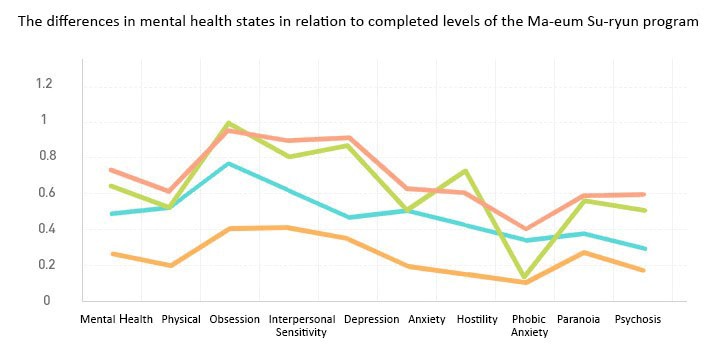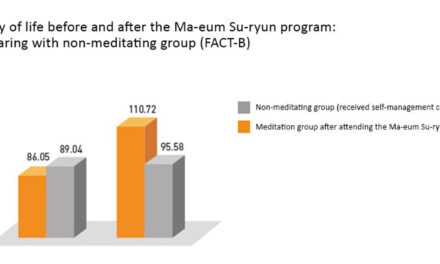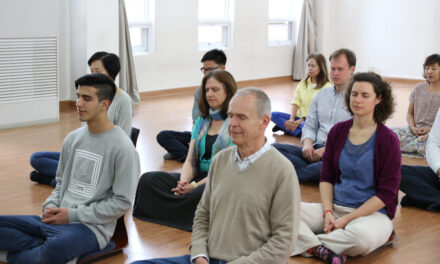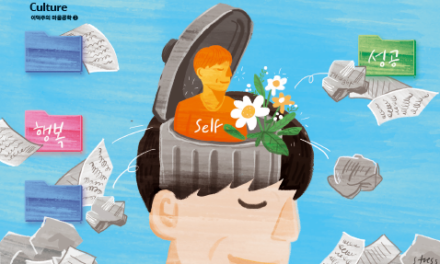
Researcher Lee, I. S. Professor, Korea Transportation University
Publisher Journal of Human Completion Vol. 4
Publishing year 2012
Meditation is a form of alternative/supplementary therapy used for alleviation of health problems. In 2007, a research study by the United States government reported that 9.4% of American adults have meditated in the last 12 months. The meditation was introduced to Western medicine by Dr. Benson of Harvard medical school; and since then, it had been used as one of the treatments in psychosomatic medicine, which is a part of integrative medicine.
In South Korea, the medical community is also aware of the indirect and direct influences of human mind on biophysical, immunological, and pathological aspect of illness. Currently, the medical community is increasingly focusing on psychosomatic medicine and its related research for health promotion and illness treatments.
This study examined the effect of Ma-eum Su-ryun on mental health and in particular, focused on individuals’ completed levels of Ma-eum Su-ryun program on changes and differences in mental health state. Henceforth, the purpose of this research was to provide a baseline data in order to develop mental health promotion program for mental health maintenance and promotion, mental illness prevention, and early detection/treatment.
149 school teachers, who were attending theMa-eum Su-ryun program, completed structured questionnaires. The results showed that with higher completed levels of the Ma-eum Su-ryun program, more improved mental health and all its 9 sub-components (physical, obsession, interpersonal sensitivity, depression, anxiety, hostility, phobic anxiety, paranoia, and psychosis) of the individuals were seen.

Study participants
149 school teachers (kindergarten, elementary, middle and high school as well as college), who consented to the study, were included.
Study measurement tool
1. The Ma-eum Su-ryun program
The basic principle of Ma-eum Su-ryun is an enlightenment to the original self by throwing away past memories of lived life and accumulated minds about the self. The program has a total of 7 levels to complete; and individuals move on to the next progressive levels when each level was completed.
2. Measuring the effect of the Ma-eum Su-ryun program
This study used Kim’s (1983) modified version of brief mental health questionnaire (SCL-90) developed by Derogatia, et al. (1973). In the questionnaire, mental health consisted of 9 sub-components of physical, obsession, interpersonal sensitivity, depression, anxiety, hostility, phobic anxiety, paranoia, and psychosis.
3. Data collection and analysis
The data collection occurred from Feb 15th to Feb 28th of 2012; and SPSS/WIN 14.0 was used to analyze the data. To examine the effect of the Ma-eum Su-ryun program levels on mental health states of school teachers, one-way ANOVA was utilized; and Scheffe’s test was utilized to post-analyze statistically significant components.
Study conclusion
There were significant differences shown in individuals’ completed levels of Ma-eum Su-ryun program and mental health states. This indicated a positive impact of the program on improving mental health states. When comparing their mental health states to other non-meditating group, the meditating school teachers’ mental health states were highly superior.
When analyzing the differences in mental health states and the completed levels of the program, the results showed significant differences in 9 sub-components of physical, obsession, interpersonal sensitivity, depression, anxiety, hostility, phobic anxiety, paranoia, and psychosis.
Of the 9 sub-components, two (obsession and hostility) in particular were shown to be very poor in individuals in first and second levels of the program. But as they advanced to higher levels of the program, they improved greatly, which indicated positive changes in mental health due to the Ma-eum Su-ryun program.
It was interesting to note that mental health and its 7 sub-components (physical, interpersonal sensitivity, depression, anxiety, phobic anxiety, paranoia, and psychosis) would improve as they advanced. But briefly got worse during the third and fourth levels, and then as they passed these levels, they improved greatly.
This aspect can be explained to beginners prior to starting the Ma-eum Su-ryun in order to help them to continue to progress without getting discouraged. Further, to re-confirm these results, additional research studies are needed to examine the mental health change differences with each completed levels.
There were definite correlations between the program and mental health; and the meditation can be a very effective self-management method to cope with stress. The research result showed the Ma-eum Su-ryun was very effective for individual’s mental health maintenance and promotion, as well as mental illness prevention. It confirmed the possibility of using the program as a strategy to manage mental health. Henceforth, it is highly recommended to utilize the program as a part of mental health promotion program for people of the communities.
Source: www.meditationlife.org














